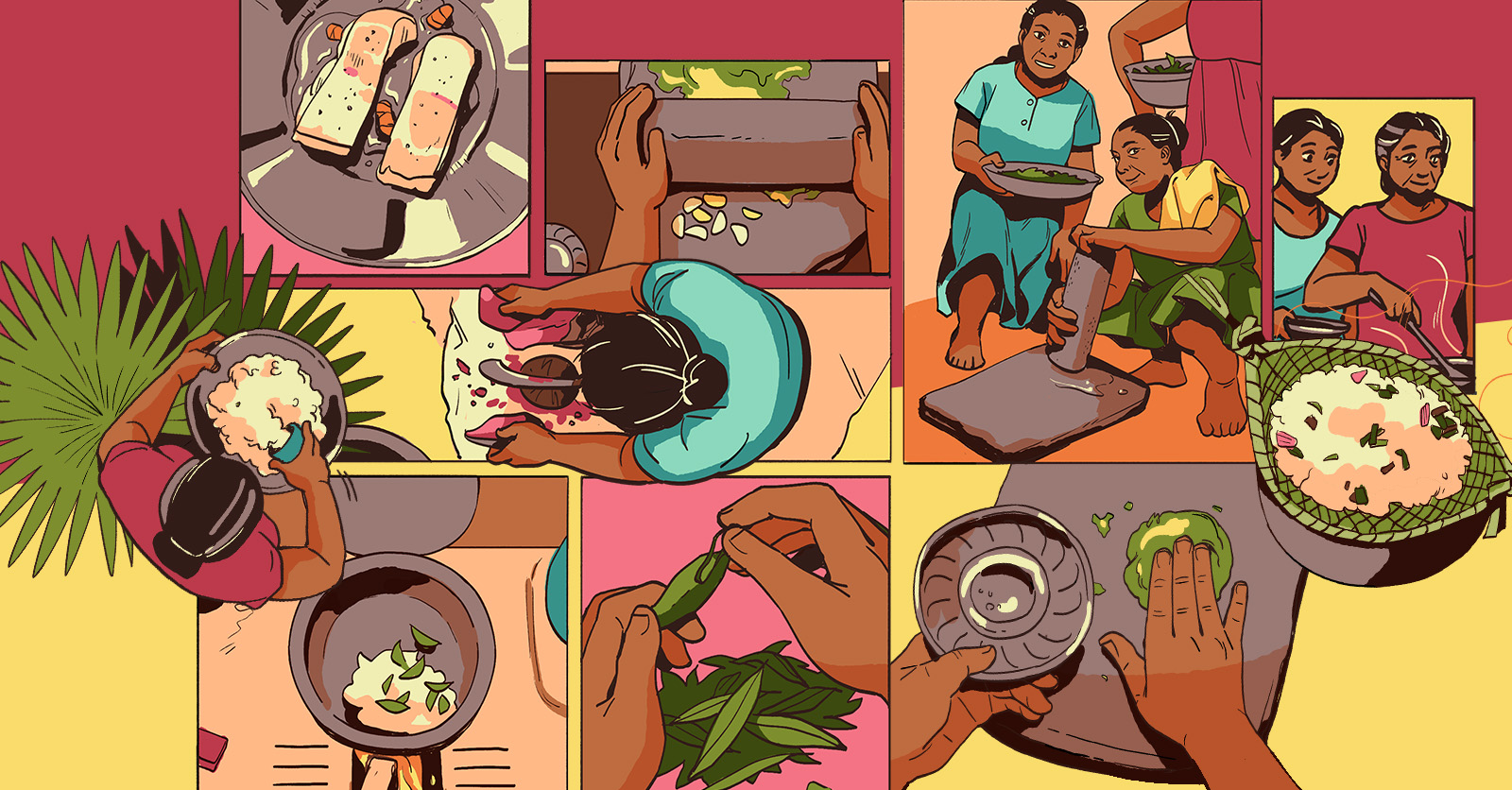
The uncomfortable reality behind foreign domestic work in Singapore
by Liani MK
Each year, scores of young women enroll to become foreign domestic workers (FDW) in Singapore.
As of June 2020, Singapore recorded a population of 252,600 domestic workers —most of whom are Indonesian and women.
But domestic workers are more than just statistics. Uneven power and gender relations in the domestic sphere continue to expose workers to exploitation, unregulated working norms, and limited legal representation. Many FDWs find themselves with few options for seeking better employment conditions.
Even though attitudes seem to be shifting, Singapore has recently seen several high-profile cases of domestic worker abuse. Access to fairer, safer employment can be a matter of life and death. Is it enough to rely on the letter of the law and ideal employers to protect FDWs’ rights? What more can be done?
Foreign domestic workers provide primary caregiving and home-based services that employers are often unable to perform due to the demands of urban working life. Their work enables their Singaporean employers to (re)enter the labour force, focus on their careers, and enjoy more leisure time. As domestic workers care for both young and older people, they often take on emotional labour in addition to the demands and responsibilities of their job, making them crucial to their employers’ everyday lives.
The economic impact of foreign domestic workers in Singapore cannot be underestimated. FDWs contributed SGD$11.1 billion to Singapore’s economy in 2018, or 2.4 percent of its GDP. This is unlikely to diminish; the government plans to double down on live-in FDWs, aiming to host 300,000 FDWs by 2030.
FDWs also elevate the economies of their home countries through remittances to their families. The Indonesian government has, for this reason, promoted female labour migration since the early 1980s as part of its development plans. From 1983 to 1993, Indonesian women’s overseas migration increased tenfold to more than 130,000 women.
Women domestic workers continue to form the bulk of Indonesian migrant workers, accounting for 90 percent of the latter in July 2020, during the COVID-19 pandemic. Most who sign up for domestic work do so for financial reasons, such as to support their families back home or send their children to school.
For almost one-third of Indonesians working abroad, Singapore falls on their top five destination countries for its perceived opportunities for high income. Singapore also serves as a “stepping stone” for women anticipating better opportunities in countries such as Saudi Arabia, Hong Kong, and Taiwan.
Several legal protections have been created to help FDWs adjust to life in Singapore. The government requires both first-time employers and FDWs to undergo orientations about their legal obligations, all paid for by employers. With handbooks available in English and Bahasa Indonesia, incoming FDWs undergo a settling-in programme to help them adapt to their work and access important information about their employment conditions and rights.
Domestic workers’ rights are addressed in the Employment of Foreign Manpower Act rather than in Singapore’s Employment Act. The former lists FDWs’ legal work conditions, such as their entitlement to sick leave, a weekly “rest day without pay (including Sunday and public holidays)”, and a contract in writing. Employers must also buy personal accident insurance for FDWs and bear their medical costs—including for pregnancy and childbirth.
Rest days, in particular, have been mandated since 2013. Employers and FDWs must come to an agreement if rest days are not taken, and employers must compensate at least one day’s salary for each rest day not taken, on top of the monthly salary. FDWs often spend their rest days on social gatherings with friends, religious worship, and skills training, taking classes in English, computer basics, and even nursing, offered by the Indonesian embassy and training schools.
Abuse against FDWs in any form is also illegal in Singapore. Employer offenses under the penal code, such as wrongful confinement or sexual assault, receive stricter penalties. If convicted of abuse, employers can face severe punishments and a permanent ban on employing FDWs.
In abuse situations, FDWs are advised to report employers to the Ministry of Manpower (MOM). In addition, FDWs may approach their embassies and NGOs, such as the Humanitarian Organisation of Migrant Economics (HOME) Academy or the Centre for Domestic Employees, for shelter.
Despite government efforts to safeguard legal rights for FDWs, domestic workers often experience maltreatment and power disparities starting from their recruitment.
Unethical Hiring Flows through Agencies
Government-certified employment agencies play a key role as migration brokers and deployers for FDWs. They are also responsible for facilitating employment, drafting employment contracts, and mediating relations between employees and employers.
The Indonesian government allows many of these agencies to manage most of the recruitment and training process. This often occurs without oversight. A new requirement for migrant workers to receive predeparture orientations on their rights, for example, gave principal responsibility to labour recruiters instead of a government agency or NGO, which might be better equipped to communicate and manage such a programme.
Unscrupulous agencies that violate workers’ rights during recruitment and orientation instead of protecting them are also common. Many FDWs have described their training centres as prisonlike, where they were taught to be submissive instead of being made aware of their rights under their destination country’s laws. In many cases, a lack of transparency regarding contract terms plagues agencies’ recruitment processes. This can threaten workers’ awareness about the contents of their contracts, the predeparture process, and the repayment terms of their recruitment.
Illegal recruiters are also a risk for foreign workers seeking domestic or nondomestic work. Sometimes, shady recruiters traffick underaged domestic workers with unverified documents into a destination country’s workforce. According to the International Organization for Migration (IOM), legal and illegal labour recruiters are responsible for more than half of trafficked Indonesian female workers in destination countries.
The Tangled Web of Fees
A domestic worker’s salary can vary based on their employment contracts, but it averages S$516–650, with an average of 13.85 working hours a day. The wage is attractive upon remittance and conversion back home, but it is scarcely enough to survive on with Singapore’s high cost of living.
In some cases, a domestic worker’s salary is withheld by her employer for about six months—even though the MOM has not allowed employers to withhold their FDW’s salary since 2019. Withholding salary is often justified as a repayment for preemployment expenses that can range from an estimated $4,000 to as high as S$10,000 (e.g., flight, agency, and placement fees). These expenses, initially unpaid, help foreign domestic workers come to Singapore and are treated as a “loan” from employers, to be repaid in time.
Numerous other hidden transactions lurk within the recruitment process. These recruitment fees lead many FDWs to take on large debts even before arriving in Singapore, where one-third of FDWs find themselves in debt. With low wages, withheld salaries, and often a lack of financial literacy, many workers borrow from moneylenders during the repayment period. Clearing these debts takes an average of 28 months.
Wage discrimination based on nationality can aggravate the financial situation for FDWs. According to the Association of Employment Agencies, FDW salaries reference the minimum monthly rates stipulated by origin countries, which can differ by more than 25 percent. The minimum rate for FDWs from Indonesia sits at S$550; a survey by HOME found that FDWs from Myanmar and Indonesia are the lowest paid of all nationalities.
Debt bondage and the lack of transparency and education can result in lower negotiating power for domestic workers, which may lead some to unknowingly fail to ask for or achieve basic rights in their employment situations in Singapore. With the backing of employment agents, this often means that employers negotiate work contracts from a position of strength, with FDWs almost rarely getting to negotiate their contract clauses at all. Many FDWs have been unaware of—or pressured into—agreeing with unfair clauses, such as accepting low salaries.
While MOM’s initiatives such as compulsory rest days have improved foreign domestic workers’ employment conditions, there is still much room for legislative improvement and reform to make domestic workers less vulnerable to systemic abuse. Singapore’s national labour law (the Employment Act), for one, makes a clear legal distinction between an employee and an FDW, who is classified as a “house, stable or garden servant”.
The perception of FDWs in the eyes of the law is further complicated by the public’s and MOM’s view of paid domestic work as familial and unique, unlike other employment-based forms of work.
Not only does this make it difficult to recognise their care work as a legitimate occupation or to manage work-life boundaries, it can also affect public perception of equal wages for domestic workers as well as female migrant workers in general. When asked whether migrant women workers should receive the same pay as Singaporean women doing the same work, 42 percent of Singaporeans did not support equal wages. Meanwhile, a survey revealed that 60 percent Singaporeans preferred for domestic workers to receive less than S$600.
An FDW does not receive complete coverage under the Employment Act, which regulates maximum working hours, contract signing, and overtime pay. Instead, FDWs must negotiate their own conditions, such as working hours, with employers through a written contract. These conditions can greatly disadvantage FDWs, who may lack the ability, bargaining power or standing needed to negotiate for better terms.
Switching Jobs
For FDWs, Work Permits are renewable after two years. While this seems fair, employers can also fire and repatriate FDWs at will simply by cancelling a work permit within the contract period. On the other hand, FDWs need written approval from their current employer to switch employers, which can make it very tough for an FDW to seek better working conditions elsewhere or even escape harm.
While Singapore has laws that clamp down on abuse, it is difficult to implement them against excessive working hours, deplorable living conditions, wage cuts and violations of rights—all of which may happen within the confines of private households. Working and living in an employer’s home also means that it is difficult to draw the line between private and shared spaces.
Singapore’s public housing, where space is often at minimum, often causes domestic workers to live in close proximity to their employers at all times. In normal households, FDWs can experience a loss of privacy, personal time, and decompression from the pressures of the job. At worst, this close contact can catalyse or aggravate domestic abuse, even hindering FDWs’ attempts to leave abusive situations.
The household’s privacy makes it hard for the state to hold employers accountable—it is difficult to ensure compliance to national laws. This means that the onus is on employers and employees—but especially the former—to moderate and protect their space and rights. When employers fail to do so, illegal and exploitative behaviour may not even be seen outside a house’s walls.
FDWs’ dependence on their employers for food and shelter can also lead them to fear speaking up when their rights and preferences are threatened. While it is legally mandatory for FDWs to possess their own identification, work, and contractual documents, many workers have noted that their employers keep their passports and work permits for at least two years.
According to a survey in 2015, only 32.6 percent of FDWs kept their passports and 66 percent kept their work permits. In the same survey, 65 percent of FDWs reported that they did not possess their employment contracts.
Dispossession of these important papers could make foreign domestic workers undocumented in the eyes of the law, due to their precarious status as foreign workers in Singapore. This can make it difficult for FDWs to exit abusive situations and even Singapore itself, much less turn to law enforcement for justice.
Combined with the structural power imbalances mentioned above, these situations yoke domestic workers to their employers’ actions and goodwill. While many employers respect and protect the rights of the FDWs they employ, such safety is by no means guaranteed.
From April 2017 to March 2018, HOME’s shelter recorded 827 domestic workers who sought protection from abuse—an average of 17 cases a week. With rising reports of runaway foreign domestic workers due to overwork, violation, and abuse, particularly during Singapore’s Circuit Breaker period amidst the COVID-19 pandemic, it is difficult to ignore the sheer imbalance of power between employers and FDWs here in Singapore.
Alarming abuses against domestic workers have emerged in emotional, physical, and sexual forms—and it seems unlikely to decline. In 2019, IT manager Tay Wee Kiat and his wife were charged with inflicting physical and emotional pain towards domestic workers Moe Moe Than and Fitriyah, such as forcing them to slap each other and bow before an altar of a different religion. More recently, in late September 2020 a woman, Nuur Audadi Yusoff, admitted to repeatedly abusing domestic worker Sulis Setyowati, causing her to climb 15 floors down to escape.
However, many forms of abuse continue to go unreported, especially for survivors of emotional and psychological harm. In 2017, six out of ten FDWs surveyed in Singapore reported that they had been exploited by their employers; one-third of them did not report their exploitation. Although MOM has issued a statement disapproving this survey for not considering factors related to the unique nature of domestic work, the survey nonetheless raises important points on the maltreatment and power dynamics FDWs face, as well as the potential for improving their working conditions.
In serious cases, domestic workers face horrific abuse both physical and psychological—and these same power imbalances and structural barriers hinder them from disclosure, help, and justice. While some believe they can seek help from their respective embassies and local authorities, many are unfamiliar with Singapore’s justice system, resources, and channels for pursuing justice should they be accused of a crime in turn. In fact, migrant workers in general are particularly vulnerable to this, and many struggle to access pro bono legal representation in the face of an employer lawsuit.
Even if FDWs access pro bono legal representation, language barriers often hinder their understanding of legal systems that operate in English or Malay instead of familiar languages such as Bahasa Indonesia. This causes some discrepancies and misrepresentations in the workers’ statements even before cases are due for court proceedings, and lawyers must work to correct mistranslations of their clients’ statements.
Adjudications and legal proceedings can take a long time, and FDWs are banned from working for other households—or earning any form of income—until they conclude. FDWs can face financial risk and even a complete loss of income during the trial period. Such cases may take several years, leaving domestic workers in further debt and their families at risk.
Even when domestic workers successfully charge their abusive employers, many will attempt to withdraw their cases between their police report and the trial’s conclusion, hoping to simply escape their place of trauma and avoid being embroiled in a case that could take months or years.
Improving FDW rights in Singapore
Today, Singapore is seeing rising awareness about foreign domestic workers’ challenges. Recently, Parti Liyani’s acquittal from her former employer’s false accusations made national news and sparked conversations—as well as optimism—about whether the law penalises errant employers and how it can better protect domestic workers.
Though they are cause for celebration, such successes are rare and only possible with the help of dedicated individuals like lawyer Anil Balchandani and committed NGOs. Organisations such as Humanitarian Organization for Migration Economics (HOME) and Transient Workers Count Too (TWC2) assist migrant workers in securing legal representation and financial assistance, largely supported by charitable donations and volunteers.
As Singapore’s population ages, the caregiving industry continues to expand and employ more foreign domestic workers to help us with the demands of urban life. We have a collective duty to become more aware of domestic workers in Singapore and their sacrifices for families and economies, both at home and abroad. While legal and structural changes are essential, standing in solidarity and compassion with the efforts and plights of the foreign domestic workers among us remains a crucial first step.
Liani is a freelance writer/scriptwriter whose works span areas of culture, history and language. When she is not wrestling with words, she enjoys wandering into nature, and the equally hypnotic worlds of art, film, gamelan and capoeira.









